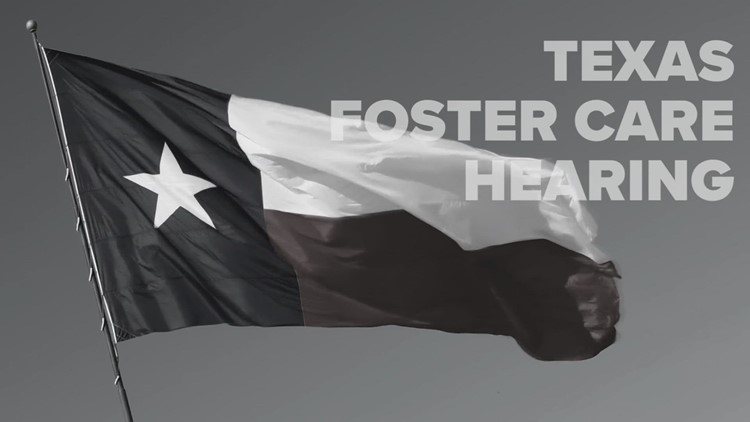DALLAS — “It’s not physically safe for these children. It’s not emotionally safe. In fact, it’s harmful.”
Those were the words delivered Tuesday morning by Julie Pennington, an attorney who currently represents children in Texas’ foster care system, on the second day of a contempt of court hearing targeting the state entities responsible for managing the system.
Pennington, along with several other witnesses, painted a bleak picture of the care Texas’ foster children receive when they are classified as children without placement (CWOP). There were also disturbing findings presented when focusing on the timelines and proficiency of investigations conducted into allegations of abuse, neglect and exploitation of children who have intellectual or developmental disabilities.
Pennington represents multiple children who are classified as CWOP. She recalled her experience when she went to visit three teenage boys she represents in Bell County.
“They appear to be in residential houses in residential neighborhoods,” said Pennington.
However, Pennington said a closer look reveals lawns that are littered with cigarette butts and trash and littered driveways.
“The grass and driveway appears to be outside of a honky-tonk bar,” Pennington said.
She said the housing situation for CWOP children is vastly different from state-licensed facilities where she often has to make an appointment, show identification and even sometimes drive through a secured gate to access her clients. Pennington also described the inside of the homes where her CWOP clients are placed as being filthy with damaged walls and a front door that is not only not locked but is usually ajar.
Pennington said when she arrives at the homes, her clients are usually not there. In fact, she said there usually aren’t any children in the home. If there are adults, they are usually hired security guards who are on their cellphones and hesitate to identify themselves to her.
“The children are out running the streets,” Pennington said. “We don’t know where they are. They come and go all through the night. They leave at 2 a.m…. 3 a.m…. No one knows where they are.”
Pennington also described issues with being able to contact the children she represents because most of the homes do not have phones. Her clients have to rely on being able to use the cellphone of whoever is working in the home at the time.
“It’s a huge barrier in my ability as an attorney to check on my youth, for my youth to contact me,” said Pennington.
Lindsey Dionne also represents children in the system. She also formerly worked as an attorney for DFPS.
“It’s not safe,” Dionne said. “They know it’s not safe.”
Dionne said she represents multiple children who have been in unlicensed housing because the state has not found a placement for them. She said some of her clients have been trafficked from those locations.
“These sex traffickers know where they are, and they are waiting in the wings,” Dionne said.
Dionne said one of the teenage girls she represents had never had a sexual encounter when she entered the state’s care. She said the girl ran away from her CWOP placement, met a trafficker and was assaulted 30 times by 30 different people a short time after.
“When they go missing, nobody looks,” Dionne said. "When they roam the streets and I find my clients, they get brought right back to CWOP and they walk right back out the door. This is every single day.”
Dionne condemned the types of places that the state uses to house the children. U.S. District Judge Janis Jack asked Dionne if the children were put in La Quinta or Residence Inn hotels with kitchens to confirm the testimony given Monday by Erica Banuelos, the associate commissioner of Child Protective Services.
Dionne denied that those were the hotels CWOP children were placed in and said she was told Motel 6 and Motel 8 hotels were the only ones that the state contracts to house the children.
“You are visibly seeing drug deals. You are visibly seeing sex work going on, then you are seeing CPS kids,” Dionne said.
She described one of her clients walking around one of the hotels in her underwear and being picked up by men. She also described a client being drugged and taken from room to room of the same motel to have sex with men who were staying there.
Dionne also said she had a client who was taken to New Orleans and then Miami, where she was trafficked. She said investigators with the state did not believe the girl was in those locations and that it took the girl calling and giving her address with hopes that someone would send her food to find her.
Dionne said her decision to leave the department stemmed from all that she experienced.
“I cannot know that these girls are being trafficked and know that the department is at fault,” said Dionne.
The court also heard from Christie Carrington, a former director and caseworker with DFPS and Viola Miller, who is an expert in child welfare.
Carrington’s testimony centered on the toll that CWOP conditions have on the staff who are required to work shifts to monitor the children as well as the conditions the children are placed in.
“CWOP is a lose-lose across the board,” said Carrington.
Miller was questioned on the six areas that the plaintiff believes that the state is failing Texas children. She had harsh words for the way state agencies are investigating allegations of abuse and neglect and the living situations for children in state care who have intellectual disabilities.
Another shocking testimony that was delivered to the court Tuesday was from Trisha Evans, who is the former director of C3 Christian Academy. The organization has been providing outpatient care for people with intellectual disabilities since 2006. From 2014, until the state revoked its certification in 2023, the organization has run eight group homes.
Evans’ organization ran the home where the teen was living when she made a dozen outcries of abuse and eventually had to receive medical care after a staff member broke her jaw in two places. That child was also living there when she said she was raped by a male staff member, who was later accused of raping his stepdaughter. The girl’s case was discussed heavily on Monday.
Evans admitted that she fired and rehired a male staff member at one of the facilities who had been accused by multiple staff members of bringing various women into the group homes while he was working at night and having sex with them. Evans said he never admitted to it, but she also said that she rehired him because he wouldn’t do it again.
It was later confirmed that the man was married to Evans’ administrative assistant.
Evans also admitted that there were outcries made by women living there who had intellectual disabilities. They alleged inappropriate touching from the man previously mentioned and other staff members.
Evans said she’d often conduct her own investigations and would not call the state hotline that was created for those reports.
“It’s not that we don’t believe it. It’s that we know the history of some of these individuals, which is to make false outcries to manipulate the situation,” said Evans.
Her reasoning was that some of the women living there had histories of making sexual abuse outcries and that one person, in particular, had “typical behavior of undressing completely in front of everybody.”
Evans claimed that she did call DFPS’s statewide intake (SWI) hotline for abuse allegations after the 15-year-old said she was raped by a male staff member, but Judge Jack said her staff searched call records and never saw a call from her. Evans said she took the girl to get a pregnancy test after the outcry.
“I don’t know how the state sleeps at night,” Judge Jack said. “I really don’t.”
The plaintiffs are expected to call their last round of witnesses to the stand on Wednesday. The hearing will resume at 9 a.m.



